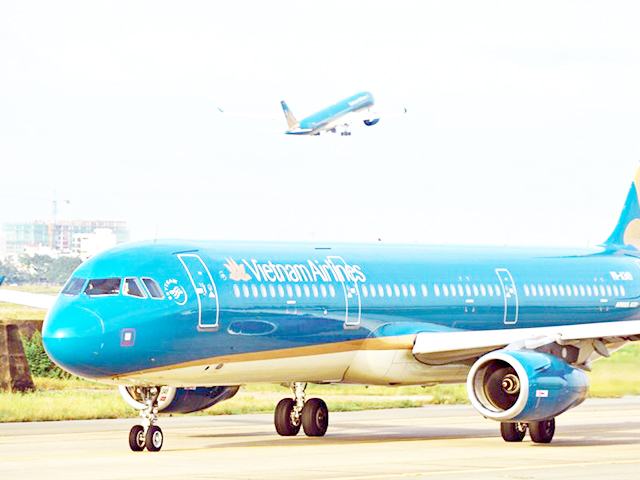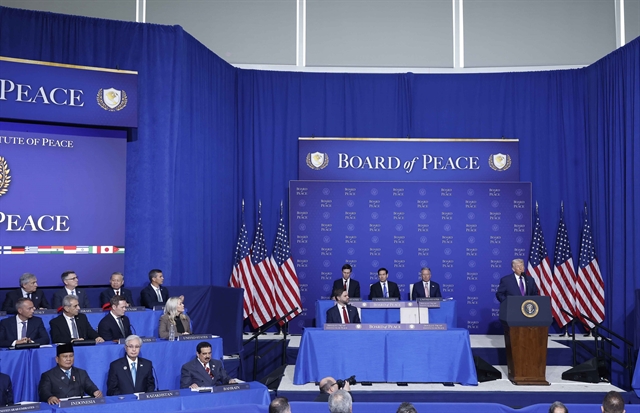 Economy
Economy
.jpg)
Dragged by the impact of the COVID-19 pandemic, the national carrier Vietnam Airlines is seeking measures to ease pressure on its cash liquidity.

|
| A Vietnam Airlines flight lands at the Nội Bài International Airport in Hà Nội. — Photo courtesy of Vietnam Airlines |
HÀ NỘI — Dragged by the impact of the COVID-19 pandemic, the national carrier Vietnam Airlines is seeking measures to ease pressure on its cash liquidity.
According to CEO Dương Trí Thành, Vietnam Airlines may face a liquidity shortage starting in September and a drop of VNĐ50 trillion (US$2.16 billion) in revenue this year.
After record profit made in 2019 and positive profit growth in the past 10 years, Vietnam Airlines may suffer a net loss of VNĐ13 trillion though the aviation firm has applied measures to cut costs.
To ease the impact of COVID-19, the company had cut VNĐ1.7 trillion worth of salaries, VNĐ24 trillion worth of operation expense and VNĐ1.7 trillion worth of monthly fuel purchase, Thành said.
In addition, the company had negotiated with lenders to reschedule debts, worth VNĐ1.94 trillion, he said.
Vietnam Airlines had also proposed its Japanese investor All Nippon Airways (ANA), which owns an 8.6 per cent stake, provide cash package to ease pressure on its cash liquidity, the CEO said.
ANA had to borrow $10 billion to fund its own activities, so the Japanese partner was unable to help Vietnam Airlines, Thành said.
According to experts and specialists, those measures are only short-term solutions and it would not help the aviation firm completely remove obstacles.
In the long term, the Government needs to provide cash stimulus for the firm and beneficial policies to boost its performance, they said.
SCIC funding
The Government, through the State Capital Investment Corporation (SCIC), is the largest shareholder at Vietnam Airlines, holding more than 86 per cent of the capital.
Thus, Vietnam Airlines wants SCIC to inject cash into the company. But SCIC is uncertain about the deal, saying the investment may not expand in the future.
According to SCIC, the two sides have sat with each other several times but there are some issues that need more time to be settled.
As a financial investor, SCIC wants to study the case, evaluate and conduct due diligence reports. Those may take SCIC six to nine months to complete the evaluation process and that may not meet Vietnam Airlines’ expectations.
As Vietnam Airlines reported a loss in the first quarter of the year, it will be unable to sell additional shares to raise capital, SCIC warns. “If the company still wants to do so, the directors must acquire the approval of the National Assembly.”
SCIC also wants some special policies if it is permitted to inject cash into Vietnam Airlines and Vietnam Airlines needs to prepare an overall, transparent and clear plan on how to use the cash to save its business.
The Government needed to keep executing its policies on tax cuts and exemptions and give priority to Vietnam Airlines, economic specialist Ngô Trí Long said.
The Government may also allow aviation firms to borrow low-interest money from banks to fund their operation and the Government could provide additional aid using the central bank’s reserves, he said.
As the global airlines industry faces difficulties caused by COVID-19, it was normal that the Government injects cash into local firms as other governments do to keep companies from bankruptcy, Trương Thanh Đức, chairman of the board of members at law firm Basico, said.
The Government and ministries also had to remove barriers in policy making, he said, adding if the measures were implemented now, Vietnam Airlines may recover quickly. — VNS
.jpg)



